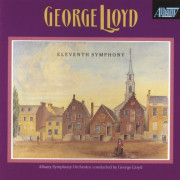

The Albany Symphony Orchestra, conducted by George Lloyd
Recorded in Troy Music Hall, New York State.
George Lloyd wrote this vigorous, tuneful, thoroughly tonal and communicative symphony when he was in his early seventies.
It is a large-scale work, its five movements adding up to just a shade under an hour. It shows that the composer found that he could still be questing and original within the limits of his natural, tonal style. His initial idea was to see how he could extend the range of sounds and variety of meanings he had been writing. He started with vague sound ideas which became more specific as he thought about them and worked out ideas and the structure to put them in. (This, by the way, is not at all an uncommon way for many composers to work.)
The two outer movements, at over fifteen minutes each, are the longest. The first movement is fiery and violent. The songful second movement is an antidote, with a flowing melody for violins against soft brass. The third movement is a dance, the fourth a funeral march. The final movement "is the light at the end of the tunnel we hope one day to see," as the composer explained.
Reviews:
....Written in a shapely, five-movement arch form , the Eleventh is simply chock-full of memorable tunes, arresting gestures, and brilliant orchestration. The idiom is unashamedly romantic in its grandeur and sweep, and in its concentration on the expression of human emotion.... Classics Today